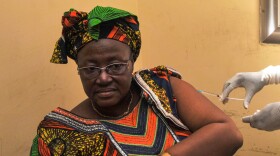
Michaeleen Doucleff
Michaeleen Doucleff, PhD, is a correspondent for NPR's Science Desk. For nearly a decade, she has been reporting for the radio and the web for NPR's global health outlet, Goats and Soda. Doucleff focuses on disease outbreaks, cross-cultural parenting, and women and children's health.
In 2014, Doucleff was part of the team that earned a George Foster Peabody award for its coverage of the Ebola outbreak in West Africa. For the series, Doucleff reported on how the epidemic ravaged maternal health and how the virus spreads through the air. In 2019, Doucleff and Senior Producer Jane Greenhalgh produced a story about how Inuit parents teach children to control their anger. That story was the most popular one on NPR.org for the year; altogether readers have spent more than 16 years worth of time reading it.
In 2021, Doucleff published a book, called Hunt, Gather, Parent, stemming from her reporting at NPR. That book became a New York Times bestseller.
Before coming to NPR in 2012, Doucleff was an editor at the journal Cell, where she wrote about the science behind pop culture. Doucleff has a bachelor degree in biology from Caltech, a doctorate in physical chemistry from the University of Berkeley, California, and a master's degree in viticulture and enology from the University of California, Davis.
-
The Zika outbreak in Florida is officially over. And cases are dropping across the Caribbean. But doctors say the risk to pregnant women there — whether residents or travelers — isn't gone.
-
Studies have shown that Zika can damage a fetus's brain in the third trimester. Would there also be an impact on the brain of a newborn?
-
You might think a monkey is making a friendly face. The monkey, however, might have a very different message in mind.
-
The Democratic Republic of Congo has been fighting a small Ebola outbreak since April. Now its government has given the green light to use a new Ebola vaccine.
-
An outbreak of botulism caused by nacho cheese sauce from a gas station has hospitalized nine people and killed one man in northern California.
-
Two travel tips are often overlooked by clinicians, and can be especially helpful when people are headed to places with less-than-ideal plumbing and sewage systems.
-
We think of antibiotic-resistance as a modern-day problem. Now scientists have evidence that these superbugs have been around for eons. Clues to their origin are offering clues to their defeat.
-
A firestorm has erupted over the ethics of using that image on Facebook to promote a photo contest — and the broader issue of how Western media depicts young women and girls in poor countries.
-
Officials are working on an emergency import deal for another vaccine that is not licensed in the U.S. Even then, a limited number of doses will be available at only a small number of clinics.
-
An inexpensive drug could dramatically reduce the number of deaths of mothers from bleeding after childbirth in low- and middle-income countries around the world.
-
The disease-spreading bugs are creeping north in the states. But will they bring diseases like Lyme and Zika with them?
-
An outbreak in Brazil isn't slowing down as predicted. Dr. Anthony Fauci calls it "a potential threat" to the U.S.











